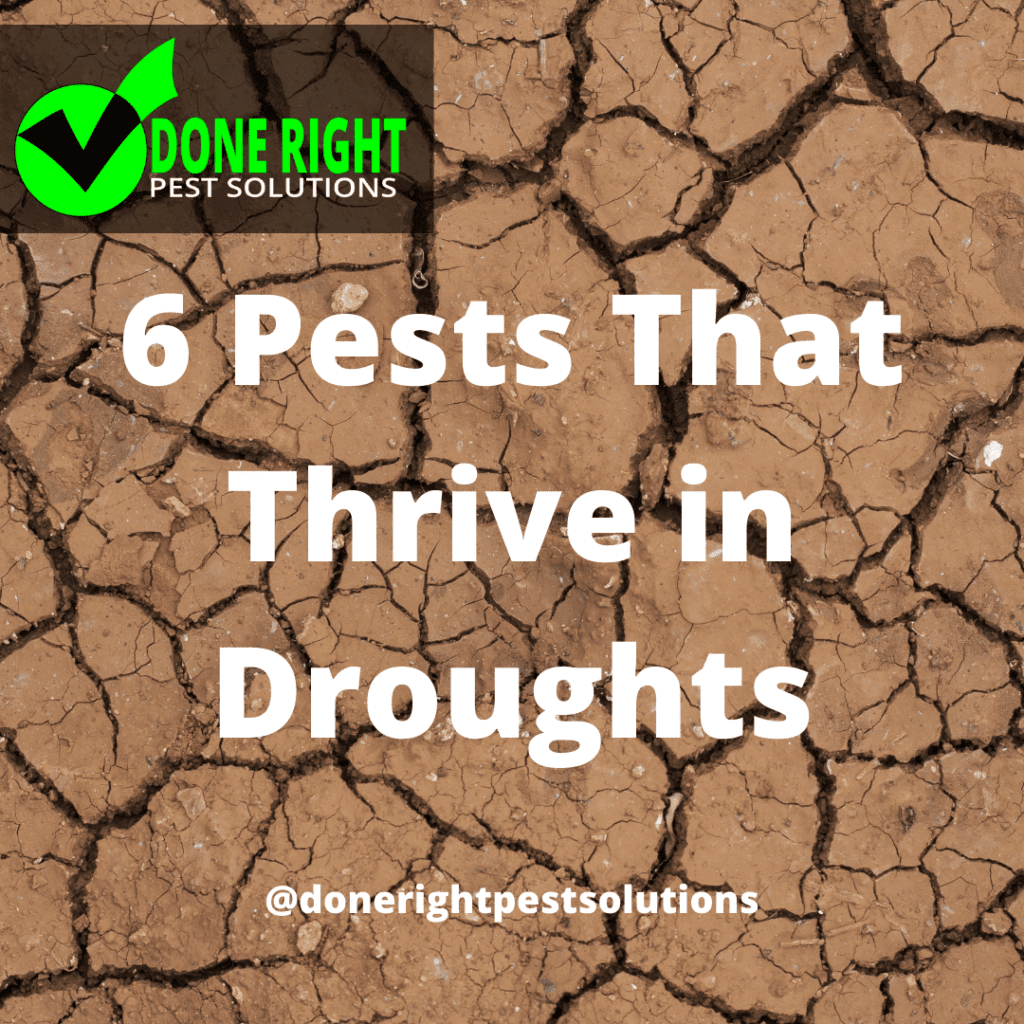If you have gardened, chances are you know all about little garden pests that like to eat your hard work. I don’t just mean bunnies, I mean like beetles, aphids, grasshoppers and other pests. Even in droughts there are pests that run wild! Learn more about 6 pests that thrive in droughts and how Done Right Pest Solutions can solve any of these pest issues for you and more.
Look no further for grasshopper control, forest tent caterpillar control, gypsy moth caterpillar control, spider mite control, aphid control than Done Right Pest Solutions!
Table of Contents
- Grasshoppers
- Chinch bugs
- Gypsy moth caterpillars
- Forest tent caterpillars
- Spider mites
- Aphids
- Bonus tips
- Importance of preventative pest control
- Conclusion & next steps
Grasshoppers
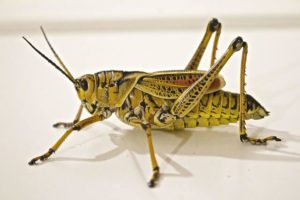
Grasshoppers and migratory wasps are more than nuisance pests, they are destructive pests.
Grasshoppers are not killed by disease. There is one type of fungus that attacks grasshoppers and it grows best in moist conditions. This is why grasshoppers made our list of 6 pests that thrive in droughts.
Grasshoppers eat plants and can go after crops. If you have a garden, it is important to have grasshopper control.
For more tips and tricks related to jumping insects, check out this category within our blog.
Chinch Bugs
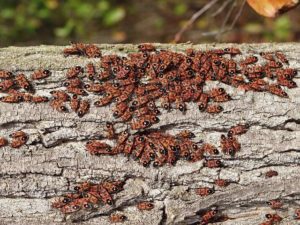
Chinch bug is a crop pest, eating on gardens and crops during drier weather. Chinch bugs also eat grass and grass plants.
In recent decades the chinch bug hasn’t been a problem because of recent modern control methods. And we want to keep it this way.
Chinch bug control is included in crawling insect treatments that can be applied around homes or gardens if need be.
Gypsy Moth Caterpillars
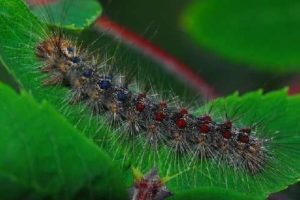
Wet spring rains grow a fungus that kills off a large population of gypsy moth caterpillars, keeping trees and foliage alive. But, in dry years or drought years, these pests often flourish.
Gypsy moth caterpillars are kind of like forest tent caterpillars in this way: they eat their foliage, damaging the trees. Just like with forest tent caterpillars, however, it usually takes a couple of years of this pest to damage a tree to the point of killing it.
However, when coupled with a drought or other factors limiting the tree’s growth, the tree can die. Everything that has stopped growing, starts dying.
If you notice your trees and foliage dying, it may be due to a gypsy moth infestation. Call a pest control company if you’re ever in need of gypsy moth control.
Forest Tent Caterpillars
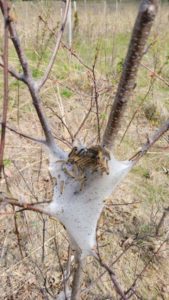
Forest tent caterpillars are more common in the dry times of the year. They spin webs on branches of trees and inhibit growth in that way. These pests, like Gypsy moths, also eat the foliage of the tree, damaging its overall growth.
Unfortunately these pests can contribute to the death of trees. If a tree needs to focus on constantly re-growing leaves and foliage, it cannot focus on root structure and growing bigger, taller and stronger. Smaller trees are even more susceptible to irreparable damage.
Forest tent caterpillars often die off with a fungus that grows when it rains, which makes these pests more prevalent in dry years or drought years.
Because forest tent caterpillars and gypsy moth caterpillars are so destructive and resilient in droughts, they easily make the list of pests that thrive in droughts.
Done Right Pest Solutions offers a quick reactive and preventative approach to forest tent caterpillar control. Our technicians inspect homes and yards, noting any areas of concern.
Want an effortless approach to all things preventative pest control? Contact us for more information about our Peak Seasons Plan!
Spider Mites
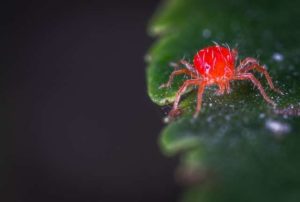
Have you ever seen leaves or pine needles turn a rusty orange or brown color in the middle of spring or summer? This is from spider mites
Spider mites cause discoloration in leaves and pine needles and contribute to illnesses that trees face. Over time and with large infestations of spider mites, trees can be damaged enough to die.
Spider mites can also get into basements and homes, but are easily solved with an external treatment, and interior spot treatment for spider mite control. Done Right Pest Solutions has expert technicians with spider mite control experience.
Aphids
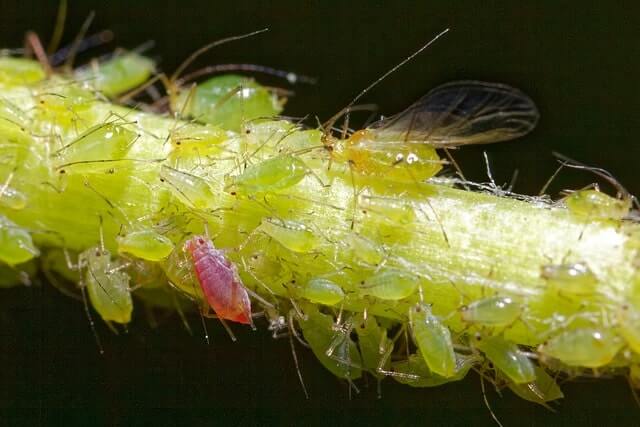
Finally, aphids and other crop pests thrive on plant growth, but stunt and often kill their growth in drought. Plants can grow in droughts if watered, but add a crop pest on top of it and there are issues.
Most farmers know of the devastating effects that aphids pose to crop life. This is why aphids are last but not least on our list of pests that thrive in droughts.
While Done Right Pest Solutions doesn’t do crop pest control, if you have aphids in your garden, we do offer aphid control for yards and gardens.
If you have aphids, you may find yourself having fall pests too. Asian lady beetles eat aphids.
Bonus Tips — Other Pests That Thrive in Droughts
Ants can thrive in the dryer parts of the year, or even droughts. Carpenter ants are summer pests and are used to the hotter temperatures. Pavement ants also thrive in hot weather.
Ants can easily find their way indoors to find a water source. Pest control companies often see spikes of ant services in hot and drought seasons.
While there are different types of mosquitoes, all mosquitoes need a water source to reproduce. This year, mosquito numbers are down for that reason.
But keep in mind that as soon as it rains, mosquito eggs will hatch in about 3 days. For effective mosquito control look no further than Done Right Pest Solutions.
Done Right Pest Solutions offers top quality ant control and carpenter ant control treatments as well as one-time or seasonal Mosquito and Tick treatments.
Importance of Preventative Pest Control
For all of these pest needs and more, it is important to have a preventative pest control program in place for your home or business. These preventative treatments are either monthly or quarterly with specific products that target the pests of each season.
And with any preventative pest control program, like our Peak Seasons Plan, any pest issues that come up in between seasons don’t cause an additional fee (with the exception of bed bugs, mosquitoes and ticks – check out our Mosquito and Tick Plan – moles or other larger wildlife).
Conclusion & Next Steps
Hopefully you’ve learned a lot in this shorter post about 6 pests that thrive in droughts. You learned about grasshoppers, spider mites, and aphids. You learned about our control measures for each.
You also learned about less commonly known insect pests like chinch bugs, gypsy moths, and forest tent caterpillars. Gypsy moths and forest tent caterpillars can be very destructive to trees.
We gave a couple of bonus tips regarding ant control, carpenter ant control, and mosquito control (mosquito eggs hatch 3 days after it rains). And finally, we briefly explained the importance of having a preventative pest control program set in place, like our Peak Seasons Plan or Mosquito and Tick Plan.
All 6 pests that thrive in droughts are included in our Peak Seasons Plan.
Of course if you ever have any questions or would like a free quote for your property, please don’t hesitate to call us at 651-342-9489 or email us at donerightpestsolutions@gmail.com.
We look forward to hearing from you soon.
Done Right Team
Have you ever experienced the devastating effects that any one of these 6 pests that thrive in droughts can cause on plant and tree life? If so, we’d love to hear about it. Tell us what you did to get rid of those pests as well!
Want to learn more about different pests? Or maybe about services and promotions we offer? Sign up for our newsletter!

